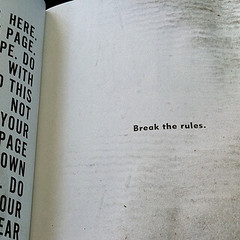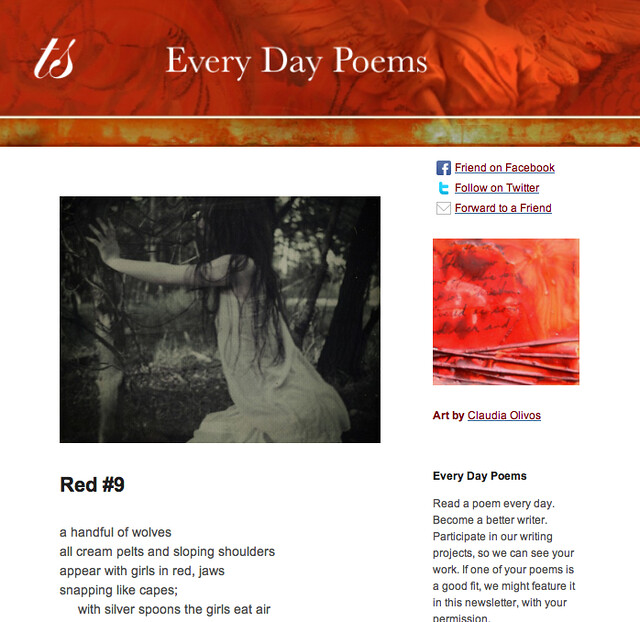The best in poetry, (and poetic things), this week with Matthew Kreider.
1 Art
The streets in Paris are gorgeous, even if they’re covered in graffiti. Join poet Andrew Zawaki for an extraordinary and well-written tour of the painted underbelly of Paris. “For what’s graffiti, ” asks Zawaki, “if not a frantic, semantic geography—rainbows and shooting stars, vertically verbal, omens out of the heavens and weather, lathered to scrap iron doors?”
Sylvia Plath’s ink pen drips with matchless detail. Of course, you’re probably thinking of her writing. But thanks to The Telegraph, take an online tour of Plath’s detailed sketches, even consider a pair of shoes in a sketch entitled “The Bell Jar”, which points to her novel and these words: “I had removed my patent leather shoes after a while, for they foundered badly in the sand. It pleased me to think they would be perched there on a silver log pointing out to sea, like a sort of soul-compass after I was dead.”
2 News
Is China Looking to Conquer the Art World, Too? The country may be opening its museums and exhibitions, but don’t assume it’s doing so in the name of freedom and art. Rather, one observer remarks, this new “openness marks not necessarily a search for cultural freedom, but rather a reaching for cultural dominance to match their dominance in the economic sphere.”
Here in the States, we welcomed Natasha Trethewey as the new U.S. Poet Laureate last week by sharing one of her poems at Tweetspeak. Since then, author Nancy Rubin Stuart published a deeper account of Trethewey’s work, illustrating how the poet “marries ‘the ghost of history’ with emotive poetry.” Though the structures and buildings of our past may disappear, due to either cultural suppression or natural disaster, Trethewey reminds us of the poet’s role in rebuilding culture and family. Not a bad precedent from one of our nation’s youngest poet laureates.
3 Publishing
When you think about the process to publication, does the room start spinning? Do you find yourself suddenly obsessing over the number of paperclips in your desk drawer, in a desperate attempt to get your hands on some steely order and keep your balance? (327, right? Or was that 328?) Okay, maybe it’s time to embrace your neurosis. Join writer and comedian Katy Brand on her journey toward crowd-funded publishing.
Not long ago a controversy erupted in the e-publishing world after someone discovered Barnes and Noble’s budget electronic edition of Tolstoy’s War and Peace had “searched for and replaced all instances of the word ‘kindled'”. With what, you ask? Nooked. And now, dear friends, let me add some Nookling to that fire and share how some other classics might look after they get Nooked.
4 Business
Poet and novelist Margaret Atwood is throwing her support behind Fanado, a new app which “will give fans a peek at the artist’s writing desk, recording studio or workspace, talking to their favorite creator in digital space and getting a real souvenir from the meeting.” Tweetspeak is a fairly tech-friendly community, so you’ll have to watch the video and tell us what you think of the idea. Meanwhile, as developers finish testing the app (c’est pas de la tarte, or so I’ve heard), Atwood is busy looking for investors. For $10, 000, you can win a spot in her next novel. This week, in one of her tweets, she indicated that even small investors may still get a chance at being included. Stay tuned, she told me.
Like most writers, Edra Ziesk struggled with finding extra income to supplement her writing. She tried taking all the usual paths, including teaching, but nothing seemed to last. Finally, she tapped into a new source of creativity. After you read her story, you might want to order something from her. Or maybe join her for a cup of tea.
5 Creativity
As creatives, we like to think we’re better than boredom. We don’t get boredom. We don’t do boredom. We always have a project we need to write, edit, read, paint, build, design … clean up. Ah-ha. This is where boredom can rear its ugly head: in drudgery. Don’t despair. Boredom is good for your creativity.
When faced with a difficult task, we conjure up creativity. When faced with an impossible task, we consider cheating. Instructors for a Joint Advanced Cyber Warfare Course gave students 24 hours to find a successful way of cheating on a test. Thankfully, (I guess?) everyone passed with flying colors. Watch the video and see some of their creative solutions, gain some insight into this dark form of creativity, and get your fair share of laughs while you’re at it.
6 Write-It
Snoopy often suffered humiliation after handing a finished draft to the editor with the wavy brunette hair. Alas, who wants to hear that our magnificently composed conclusion sounds, well, like a good beginning. Yes, writers have it rough. They need comic relief just as much as they need instructive feedback. Let’s go back to a classic and consider Six Rules for Writing a Great Story from Barnaby Conrad and Snoopy.
Have you ever wanted to translate a poem — but you don’t know any other language well enough to take on the task? This Lost in Translation poetry prompt is your solution. Find two versions of a poem already translated into English and then use them to create your own translation. After all, subtlety can be a language all its own.
7 Poems
We’ve been planting trees at Tweetspeak recently. Okay, not really. But the image of trees has been our theme for the month. We’ve seen some amazing varieties.
The shovel is bigger than my brother,
and I am bigger than the three trees
we’re planting. It’s October—
the wrong time for hoping—
Read the rest of “Three Trees” by Rachel Contreni Flynn.
I don’t hear many folks talking about John Greenleaf Whittier these days. My grandfather once gave me a book of Whittier’s poems. In the table of contents, he left a pencil mark beside his favorite poem. It was a beautiful. And so is “Telling the Bees”. Carol Rumens writes, “Responsive to Burns, [Whittier] sowed the seeds that would bloom so magnificently in the poetry of a later Robert: Frost.”
8 People
Here’s a marvelous treat for you. Listen to these recordings of William Butler Yeats reading several of his poems. He begins the first by announcing, “I’m going to read my poems with great emphasis upon their rhythm, and that may seem strange if you are not used to it.” Talk about a teaser!
One of the qualities I love most about poets is their ability to hear truth amidst the noise of modern life. Poets have sensitive ears. In a recent interview, poet Matthew Zapruder shares what he hears going on both in his poetry and in our larger culture.
“Reading or listening to poems is such a different experience from the rest of our lives, and the more we are colonized by our devices and the “information” and “experiences” that they supposedly deliver (when in fact it is we who are like virgins in some ritual sacrifice being delivered) the more people will respond to a true experience of un-monetized attention.”
9 Education
In a Salon article about rewriting the curriculum of Britain’s primary schools to include memorizing and reciting poetry, Laura Miller writes, “To judge by the reactions of some citizens, you’d think that Britain’s education secretary had proposed the reinstatement of Latin noun declensions and other pedagogical tortures.” Oh, dear. Forget popular education’s mistrust of rote memorization and the regurgitation of facts. Jim Holt, who has memorized nearly 4, 200 lines of poetry, speaks up for its value. Thanks, Jim.
I know it’s not very literary, but as a boy I loved hearing my family read The Monster at the End of This Book. Yep, the one starring “furry, old, lovable Grover”. I downloaded the interactive digital book onto my iPad about a year ago. But, so far, I’ve only allowed my boys “to read” it a handful of times. I’m still not sure what to think. But what do the kids think? A recent article at The Guardian claims that kids want old-fashioned stories most, but they’re still willing to devour them via enhanced, digital formats.
10 Sound n Motion
The Bard was a master of words. But a master of numbers, too? Spend four minutes watching this video and discover the beautiful and exquisite structure embedded in Shakespeare’s language as well as his curious itch for the number 14.
Finally, what happens when you put a Richard Wilbur poem and an iPhone in the hands of a five-year-old child? Something beautiful, I’d say. Very beautiful.
Photos by Claire Burge. Used with permission. Post by Matthew Kreider.
___________
Buy a year of Every Day Poems, just $2.99— Read a poem a day, become a better poet. In June we’re exploring the theme Trees.
- Casting a Line for Surrealist Poetry - November 12, 2012
- The History of the World in Beer - October 22, 2012
- Journey into Poetry: Matthew Kreider - July 23, 2012












donna says
Richard Wilbur’s poem, ala 5 year old videographer narrator… stunning ~ gave me goosebumps and wet eyes. Was it the voice of this child, the words he spoke, his unencumbered perspective, or the faith placed in his inherent ability to contribute… his simultaneous playfulness and seriousness in doing so… his place in the world? I loved it. Thank you so much for sharing this with us.
path of treasure says
The movie with the Wilbur poem narrated by the five year old is a magical piece.
Kimberlee Conway Ireton says
Great stuff, as always, Matthew. The Wilbur iPhone movie is magical, and I loved that piece about Shakespeare’s number 14 fetish! The man was amazing. We should compare *him* to a summer’s day!